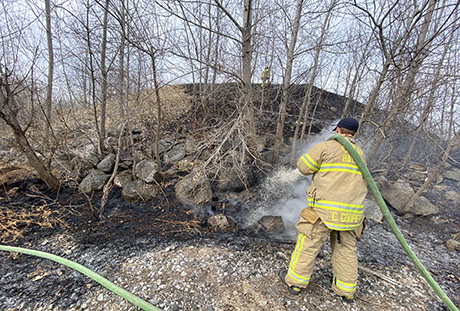Press release:
Department of Environmental Conservation (DEC) Commissioner Basil Seggos today reminds residents that with spring approaching, conditions for wildfires will become heightened and residential brush burning is prohibited March 16 through May 14 across New York State.
“While many people associate wildfires with the Western United States, the start of spring weather and the potential for dry conditions increases the risk for wildfires in New York,” Commissioner Seggos said.
“New York prohibits residential burning during the coming high-risk fire season to reduce wildfires and protect people, property, and natural resources. The ban has been extremely effective in reducing the number of wildfires, and we're encouraging New Yorkers to put safety first.”
Even though much of the state is currently blanketed in snow, warming temperatures can quickly cause wildfire conditions to arise.
DEC posts daily a fire danger rating map and forecast during fire season on its website and on the NY Fishing, Hunting & Wildlife App available on DEC's website. Currently, wildfire conditions in the state are low risk.
Historically, open burning of debris is the largest single cause of spring wildfires in New York State. When temperatures are warmer and the past fall's debris, dead grass, and leaves dry out, wildfires can start and spread easily and be further fueled by winds and a lack of green vegetation.
New York first enacted strict restrictions on open burning in 2009 to help prevent wildfires and reduce air pollution. State regulations allow residential brush fires in towns with fewer than 20,000 residents during most of the year, but prohibit such burning in spring when most wildfires in New York occur.
Since the ban was established, the eight-year annual average number of spring fires decreased by 42.6 percent, from 2,649 in 2009, to 1,521 in 2018.
Campfires using charcoal or untreated wood are allowed, but people should never leave such fires unattended and must extinguish them. Burning garbage or leaves is prohibited year-round.
Wildfires can be deadly and destructive, and the national annual cost of their consequences can range anywhere from $71.1 to $347.8 billion, according to recent study by the U.S. Department of Commerce.
Last year’s Camp Fire in northern California destroyed the city of Paradise and killed more than 80 people, making it the nation's deadliest wildfire in more than a century.
This year, the USDA Forest Service, the National Association of State Foresters, and the Ad Council are celebrating the 75th anniversary of the launch of the Smokey Bear Wildfire Prevention campaign, the longest-running public service advertising campaign in U.S. history.
“Smokey Bear has educated generations of Americans about their role in preventing wildfires,” Commissioner Seggos said. “Smokey’s words are still an urgent and relevant reminder for all of us to follow—‘Remember, only YOU can prevent forest fires.' ”
Some towns, primarily in and around the Adirondack and Catskill parks, are designated "fire towns." Open burning is prohibited year-round in these municipalities unless an individual or group has a written permit from DEC.
To find out whether a municipality is designated a "fire town" or to obtain a permit, contact the appropriate DEC regional office. A list of regional offices is available on DEC's website.
Violators of the state's open burning regulation are subject to both criminal and civil enforcement actions, with a minimum fine of $500 for a first offense. To report environmental law violations call 1-800-TIPP DEC (1-800-847-7332), or report online on DEC's website.

